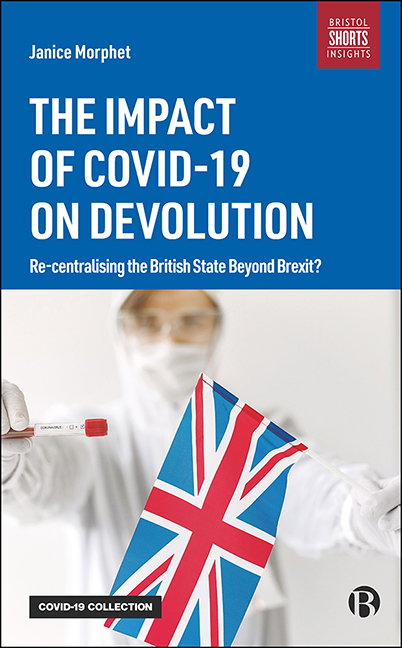Book contents
- Frontmatter
- Contents
- Preface
- List of Abbreviations
- one Devolution in the UK: The Twin Challenges of Brexit and COVID-19
- two Central Government, Brexit and COVID-19: Centralisation Through Privatisation?
- three The Role of the Devolved Nations in Meeting COVID-19
- four Getting to the Local: Managing the Pandemic in Practice
- five COVID-19 and a UK Unitary State Post-Brexit?
- References
- Index
five - COVID-19 and a UK Unitary State Post-Brexit?
Published online by Cambridge University Press: 04 January 2022
- Frontmatter
- Contents
- Preface
- List of Abbreviations
- one Devolution in the UK: The Twin Challenges of Brexit and COVID-19
- two Central Government, Brexit and COVID-19: Centralisation Through Privatisation?
- three The Role of the Devolved Nations in Meeting COVID-19
- four Getting to the Local: Managing the Pandemic in Practice
- five COVID-19 and a UK Unitary State Post-Brexit?
- References
- Index
Summary
Introduction
The moves that have been made by PMs May and Johnson since 2016 to use Brexit and then COVID-19 to ‘restore the centre’ (Dahlström et al 2011) have been seen at different state scales. The pandemic has both provided opportunities for accelerated centralisation, ahead of Brexit, and for more clearly defining the role of devolution in Scotland, Wales and Northern Ireland. Devolved leadership has become more distinctive and has increased trust in the devolved Governments over that for the PM (Curtice 2020). The position in England has also been made more transparent as a consequence. Despite the PM starting the pandemic with a UK approach, very rapidly he has been shown to be the FM of England. The longstanding confusion of UK Ministers not knowing when they are speaking for the UK or for England has had to be addressed (Cushion et al 2020). The differences between the independence and local determination in the three nations in comparison with England has not only led to greater regional and local identification and leadership in England from local government and Mayors of MCAs, but has also been reinforced by MPs. At the introduction of the tiered system in England after the second lockdown from 2 December, MPs have strongly argued against national approaches and in favour of local determination of the management of the pandemic at individual local authority level.
The effect of the pandemic in reinforcing confidence in devolution has led to the PM telling his MPs that devolution has been a ‘disaster’ and the greatest policy failing of PM Blair's time in office. The 2019 Queen's Speech reinforced the role of the Dunlop review of capability in the union established by PM May in July 2019 and appears to have taken a confrontational and competitive approach to working with the devolved administrations (Sargeant 2020). While there has been criticism of four different approaches within the UK for managing the pandemic, efforts to come together to determine a common approach for Christmas 2020 were undermined by the PM's failure to attend the meeting with the FMs, which was noted and criticised by the FM of Wales. Mount (2020a; 2020b) argues that this approach to devolution has been longstanding in the Conservative Party, with Pittock (1998) suggesting that it lies in the roots of Tory philosophy since the 18th century.
- Type
- Chapter
- Information
- The Impact of COVID-19 on DevolutionRecentralising the British State beyond Brexit?, pp. 73 - 86Publisher: Bristol University PressPrint publication year: 2021



